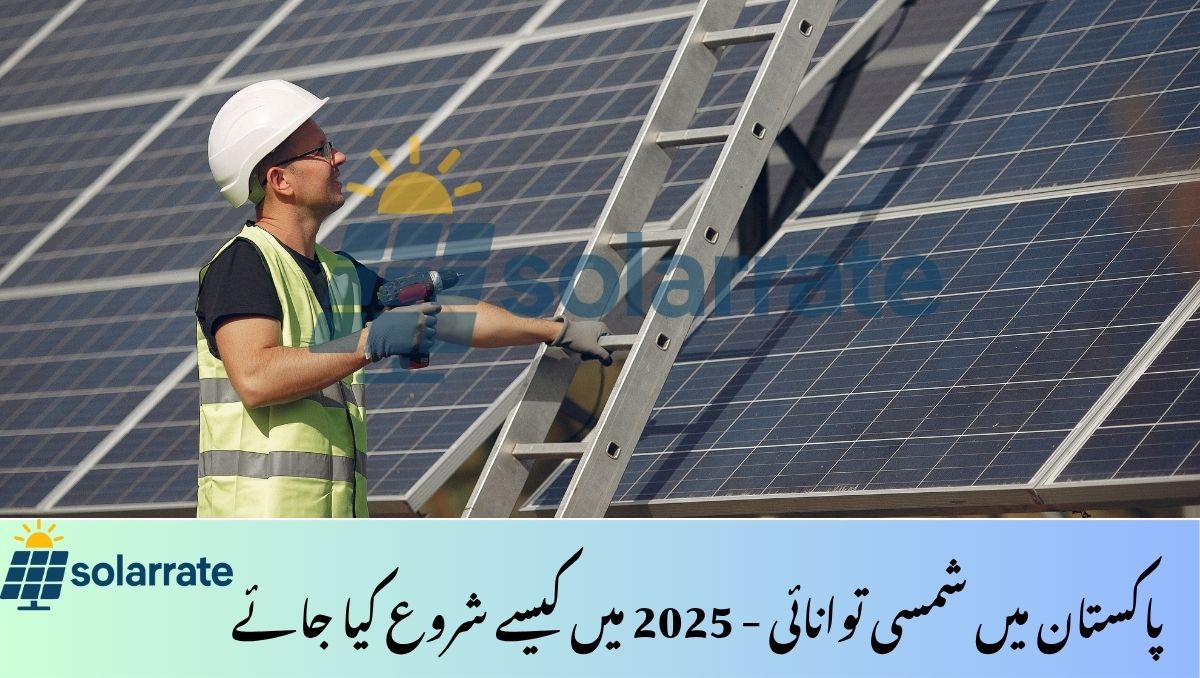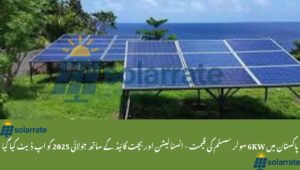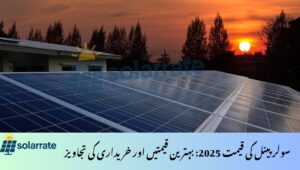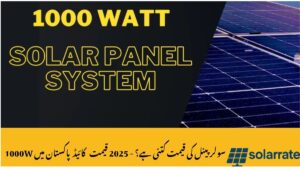Solar Energy in Pakistan is becoming one of the best and cheapest ways to generate electricity in Pakistan in 2025. Many people are worried due to rising electricity bills and frequent load shedding, which is causing problems for households and businesses. Even farmers are turning to solar energy to meet their needs. The government is introducing various schemes, subsidies and interest-free loans to benefit and encourage people.
Whether you want to reduce your monthly bill or live in an area without a reliable electricity supply, Solar Energy in Pakistan is a great life-changing solution. We are here to help you with the basics of solar energy, its benefits, government initiatives in 2025, and help you start using solar energy in your home or business. We are telling you the following things in detail to help you.

Apply Now : https://cmsolarscheme.punjab.gov.pk/
Why Solar Energy is the Future of Pakistan
Pakistan gets sunlight all year round. The country’s mountainous regions get eight to ten hours of sunlight per day, making solar power a natural choice for power generation. Traditional solar PV systems are costly and expensive to install, so they are adopted only by people who can afford them.
And here are some of the key features of rapid growth:
⚡ High electricity prices have increased the cost per unit of electricity many times over the past few years. Serious planning can reduce the cost of your business or even bring it to zero if you build a large enough system.
🔋 Load-shedding problems can be solved by solar panels coupled with electricity generation during power outages.
🏛️ Government incentives will make solar power cheaper and more affordable by 2025.
🌱 Solar power has been introduced in various sectors for the environment, reducing greenhouse gas emissions and helping to combat climate change.
Types of Solar Energy in Pakistan
If you are planning to start your solar journey, you should know that there are three best types of solar systems in Pakistan:
🔌 On-grid system – Connected to the main electricity grid, can feed excess electricity back to the grid through net metering. This system is best for cities and towns where there is a regular electricity connection.
🔋 Off-grid system – Uses batteries for storage, making them independent of the grid for life. Ideal for remote areas without access to the grid.
⚡ Hybrid system – A combination of on-grid and off-grid, giving you both grid connectivity and battery backup.
Also Read : BISP 8171 Portal – Ehsaas Program August 2025 Key Developments
Government Support for Solar Energy in Pakistan 2025
The Government of Pakistan is doing its best to make solar energy accessible to everyone. In 2025, some important information includes:
| Program / Facility | Description |
|---|---|
| ☀️ Roshan Gharana Solar Panel Scheme | Providing free or subsidized solar panels to low-income families. |
| 💰 Interest-Free Loans | Offered by banks like the National Bank of Pakistan (NBP) to make solar energy installation affordable. |
| 🔄 Net Metering Facility | Allows homeowners to sell excess electricity back to the grid and get credit on their bills. |
| 📉 Tax Reduction | Reduced import duty on solar panels and equipment. |
Step-by-Step Guide: How to Get Started with Solar Energy in Pakistan
If you want to start using Solar Energy in Pakistan, follow these simple and best steps:
1️⃣ Calculate your electricity needs 📊
Check your monthly bill to see average consumption in kWh. This helps decide the solar system capacity you need.
2️⃣ Choose the right type of solar system ⚡
On-grid for cost savings, hybrid or off-grid for areas with long outages.
3️⃣ Set your budget 💰
In 2025, a 5kW system costs around PKR 8–10 lakh, and a 10kW system costs PKR 15–20 lakh.
4️⃣ Choose a reliable installer 🛠️
Look for experience, licensing, warranties, and Tier-1 quality panels and inverters.
5️⃣ Apply for net metering (optional) 🔄
Through companies like LESCO, K-Electric, or FESCO to sell excess electricity back to the grid.
6️⃣ Install and maintain your system 🧹
Clean panels every 1–2 months. Panels last 20–25 years with minimal care.
Also Read : Low-Cost Housing Scheme 2025 Re-Launched – Govt Offers Markup Subsidy & 100% Bank Guarantee
Costs and Savings Solar Energy in Pakistan 2025
While the initial cost of installing Solar Energy in Pakistan may seem high, the long-term savings are huge. Most people recover their investment within 4–5 years. For example:
💡 A 5kW system can reduce your bill by 80–100% for a small household.
🔄 With net metering, you can even get negative bills, meaning the company owes you money.
💰 You save thousands of rupees each month while protecting yourself from future price hikes.
Common Myths About Solar Energy in Pakistan
☁️ Myth 1: Solar Panels Don’t Work on Cloudy Days – They still generate electricity, just at a lower efficiency.
💰 Myth 2: Solar Energy is Too Expensive – With 2025 subsidies and loans, it’s now more affordable than ever.
🧹 Myth 3: Solar Panels Require a Lot of Maintenance – They only need basic cleaning a few times a year.
Conclusion
Solar Energy in Pakistan is not just a trend — it’s a smart investment for 2025 and beyond. With rising electricity prices, frequent load-shedding, and growing environmental concerns, solar power offers a clean, affordable, and reliable solution. Government schemes, subsidies, and loans have made installation easier than ever before. By choosing the right system and following proper maintenance, you can enjoy decades of savings. Now is the perfect time to switch to solar and take control of your energy future.
FAQ’s
Is solar energy worth it in Pakistan in 2025?
Yes, with rising electricity costs, government subsidies, and abundant sunlight, solar energy is highly cost-effective in Pakistan.
How much does a Solar Energy in Pakistan cost in 2025?
A 5kW system costs around PKR 8–10 lakh, while a 10kW system ranges from PKR 15–20 lakh, depending on brand and quality.
Can I sell extra electricity to the grid?
Yes, through net metering, you can sell surplus electricity to the grid and get credit on your bill.
Does solar work during load-shedding?
Yes, with hybrid or off-grid systems, you can store power in batteries to use during outages.
Do solar panels need a lot of maintenance?
No, they only require cleaning every 1–2 months and can last 20–25 years.




